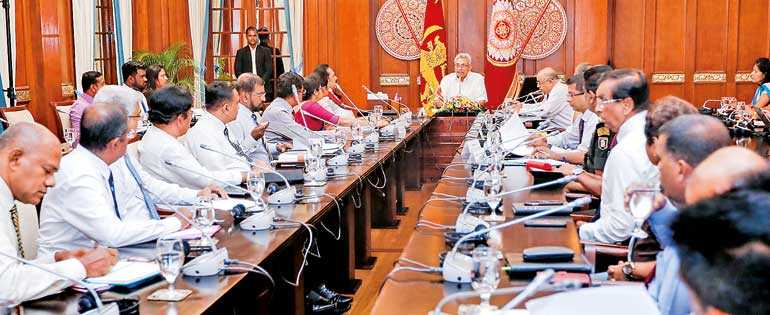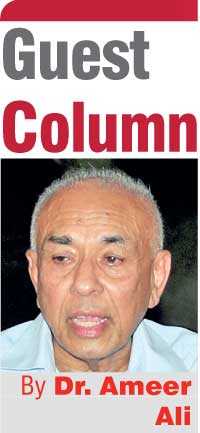Sunday Feb 15, 2026
Sunday Feb 15, 2026
Tuesday, 17 March 2020 00:03 - - {{hitsCtrl.values.hits}}

President Gotabaya Rajapaksa chairing a meeting on tackling the coronavirus crisis. The President has called for cooperation of the entire nation to eliminate Covid-19, and his Prime Minister MR wanted ‘all Lankans’ to come together. Why only for this? Don’t they want that same co-operation extended to build the nation and its economy? Why is it not forthcoming?
Coronavirus has created health and economic crises globally. While the vast majority of people are monitoring closely how their health indicators are ticking, there is one class, which is panicking about the shock waves lapping the shores of stock markets.
From New York to Colombo, billions of dollars have been wiped out and signs of a quick reversal are looking dimmer. Government revenues are falling, budget deficits worsening, supply shortages escalating, airline and tourism industries are crippled and unemployment is rising. 
An already underemployed, or, to use a new term gaining currency now, casualised job market, is facing even greater unemployment, casualisation and job insecurity. In short, the economic impact of Covid-19 appears to be far worse than that of 2008 Global Financial Crisis (GFC). Global economic managers are obviously reluctant to use the R-word, recession.
Coronavirus has exposed once again the ugly face of globalisation. Since the twin collapse of Marxian and Keynesian economic management from the late 1970s and 1980s, both with fixed exchange rates and protected markets, economies were inundated with paeans for flexible exchange rates and free markets.
Monetarists and supply siders advocated for open economies, and economic managers welcomed the revolution in communication technology and electronics, which, by virtually killing time and distance, heralded the arrival of the era of globalisation. The world was squeezed into a global village, and capitalism globalised itself at turbo-speed.
When protest against economic inequities and social injustices caused by globalisation emerged to the fore by the end of 20th and beginning of 21st centuries, and threatened to escalate as an anti-globalisation movement, Bin Laden and his Al-Qaeda came to the rescue of global capitalists and provided them with a golden opportunity to turn world’s attention aw from anti-globalisation and towards confronting terrorism, of the Islamic variety. Even the anti-globalisation protestors were in danger of being thrown into the terrorist camp. That killed the protest movement, and globalisation continued unchallenged thereafter.
Even after the GFC, the Occupy Wall Street movement, which began on 17 September 2011, following the Arab Spring in December 2010, failed to slowdown the globalisation locomotive. In globalisation, Francis Fukayama even saw The End of History and the Last Man.
There is now a possibility that what the previous movements failed to achieve a virus may be able to do. Coronavirus has shown that globalisation, by shrinking the world into a village through technological marvels, has also facilitated dangerous bacteria and viruses to travel faster than before and enter anywhere in the same borderless village with devastating effects.
Scientists’ ability to isolate these viruses and destroy them right at the point of origin is becoming increasingly difficult and enormously expensive. True, humans are capable of discovering antidotes, but it will take time and huge effort. Covid-19 has travelled faster and infected more people than Severe Acute Respiratory Syndrome (SARS) and Middle East Respiratory Syndrome (MERS) combined. It is also worse than the Ebola crisis. The antidote to Covid-19 is still years away. Even if it is controlled, the next one may be even deadlier.
The chief carriers of these viruses are humans who are now travelling more frequently than before, and in ever increasing numbers, for work, business and pleasure. Globalisation has integrated economies horizontally, and those economies are becoming increasingly financialised.
While excess capacity and under consumption afflict product markets, financial markets have become tightly knit gambling dens creating colossal amount of financial wealth largely delinked with product markets. Financialisation of economies are making them increasingly vulnerable to unexpected convulsions. What it implies is that the rippling effects of a disturbance in one corner of the world catch the entire world unprepared and almost instantaneously.
The latest stock market crash, supply chain disruption, budget crises, unemployment and massive welfare handouts are the ripple effects of Covid-19 that started in Wuhan. This is the horror effect of globalisation and to reduce that effect national economies have to protect their own backyard. Globalisation must be tamed and turned into glocalisation, at least to absorb part of the economic shocks generated by epidemics and other such disasters.
It is therefore time to think of structural reforms, especially in an economy like Sri Lanka, which is too small but closely integrated with global markets, thanks to JR’s love of capitalism. Reforms are desperately needed to withstand the shocks from global disturbances.
How to make the economy resilient to such dangers is a challenge facing GR’s presidency and its economic policymakers. The response needs more than a patch work of strengthening macroeconomic fundamentals and ad hoc fiscal stimulus, and requires a coordinated approach to structural transformation.
With a renowned economist at the helm of the Central Bank, who has already indicated his readiness to make liberal economics more humane, the time is ripe to undertake this task. However, as the Head of Central Bank also stressed, it requires some hard hitting political decisions from the Government.
One such decision is the solution to the national question. President GR called for cooperation of the entire nation to eliminate Covid-19, and his Prime Minister MR wanted ‘all Lankans’ to come together. Why only for this? Don’t they want that same co-operation extended to build the nation and its economy? Why is it not forthcoming?
Sri Lanka is a plural society that embraced a democratic political structure after four and a half centuries of colonialism, and each of the plural component must feel equal in all respects. If democracy is hijacked by one dominant group and strives to consume the whole not only the substance of democracy but also the cohesive ethos of pluralism are jeopardised.
It is rationally and ethically wrong and nationally destructive for one component of that plurality to claim supremacy and preferential treatment while the interests of others are side-lined. This is the fundamental issue that thwarts collective effort and that leaders of major political parties are failing to address. Hunger for power has blinded the leaders’ national vision. In trying to drive out a global pestilence, let us also drive out our own domestic pestilence of ethnic and religious hatred.
Finally, Covid-19, like the environment, is teaching us one good lesson. That is, one cannot survive by the loss of another. It is not a zero sum game. Only a collective national effort can convert zero sum games into positive sum games. Will the supremacists learn this lesson and strive to find a solution to the national question?
(The writer is attached to the School of Business and Governance, Murdoch University, Western Australia.)